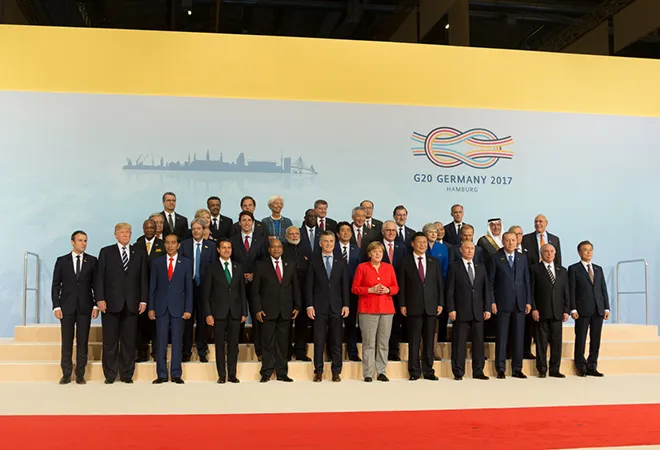-
CENTRES
Progammes & Centres
Location
It will, however, be an important platform to underscore the commitment of major powers for global economic stability

This year's G20 summit will commence in Argentina on Friday and there is too much at stake given the geopolitical and geo-economic turmoil the world is passing through.
It was in 2009, against the backdrop of global financial crisis, that the G20 replaced G8 as the main platform of major economic powers for the coordination of policies pertaining to global financial stability. Since then the stature of this Group of Twenty has only grown, with global powers using it to signal their intent regarding the future direction of their policies as well nudging other stakeholders towards enhancing cooperation.
Last year's summit in Hamburg, Germany, not only focused on global trade and financial market regulation but also on issues such as migration, health, future of work, the role of women in economic development, digitisation and terrorism.
However, the global environment has evolved rapidly over the last year. Economic volatility engendered by growing trade tensions among major powers is making the future of global economy extremely uncertain. Disenchantment with economic globalisation continues to be at an all-time high with new political leadership in various countries challenging the fundamental consensus on which the growth of globalisation has so far been premised. China's economic situation continues to be tenuous and the European Union continues to struggle with Brexit and all its attendant consequences. In West Asia, regional powers are contesting bitterly to retain their influence. Tensions are once again on the rise between Russia and Ukraine, further vitiating an already embittered relationship between Russia and the West.
As a consequence, the presence of so many key world leaders on a single platform will be keenly watched and can have some significant implications for the immediate future. United States President Donald Trump and Chinese President Xi Jinping will be meeting in an attempt to sort out their trade disputes on the sidelines of the meeting. The Trump administration continues to insist that it is ready to impose new tariffs on Chinese imports if no deal is reached. Washington is also taking a strong stand on the plight of the Uighurs and a bipartisan group of US lawmakers is asking for sanctions to be imposed on Beijing over its treatment of the minority group.
According to various estimates, at least one million Uighurs have been imprisoned in enormous "re-education centres" in Xinjiang. China, for its part, has threatened retaliation if the US pursues the course of sanctions on this issue.
America's economy grew faster than other advanced economies in the last quarter but its trade deficit has grown for the month of October, underlining the limited utility of tariffs as a policy tool to manage this problem. Ahead of his meeting with Trump, Xi too is trying to assuage some concerns by suggesting that China will "sharply widen" the door for foreign investors and will also "step up" the protection of intellectual property rights (IPR).
Beyond the US-China dynamic, America's allies are also seeking to get a sense of Trump's priorities on trade. With Trump threatening to put tariffs on car imports, the European Union (EU) and Japan would be hoping to persuade the US to not go down this route. While Trump's relationship with the French President, the German Chancellor and even the British Prime Minister is testy, he will have a new partner in the new Italian government led by Prime Minister Giuseppe Conte, which is ideologically similar to his own.
As tensions have escalated between Moscow and Ukraine after Russia seized Ukrainian naval vessels in the Kerch Strait, Trump, who is supposed to meet the Russian President on the sidelines of the G20, has threatened that he might cancel his bilateral meeting with Vladimir Putin. Many in the EU are viewing the Ukraine crisis as the biggest security challenge to Europe. In this context, it remains to be seen if the transatlantic alliance can stand in unison against Putin and arrive at a consensus on sanctions against Russia.
India will also be engaged in a trilateral meeting with Trump and the Japanese Prime Minister Shinzo Abe at the G20. The three Indo-Pacific powers will continue the process of sustained engagement as they firm up their relationship so as to shape a stable balance of power in the region.
The challenges facing the global polity and economy are huge and it is unlikely that the Buenos Aires G20 summit will be able to come up with all the solutions. It will, however, be an important platform to underscore the commitment of major powers for global economic stability. In these turbulent times, such signalling, if it is coherent, will be achievement enough.
This commentary originally appeared in Money Control.
The views expressed above belong to the author(s). ORF research and analyses now available on Telegram! Click here to access our curated content — blogs, longforms and interviews.

Professor Harsh V. Pant is Vice President – Studies and Foreign Policy at Observer Research Foundation, New Delhi. He is a Professor of International Relations ...
Read More +